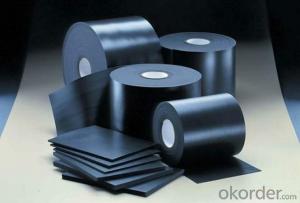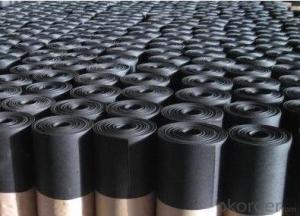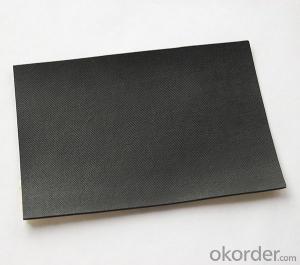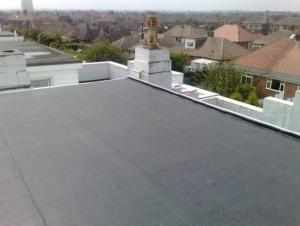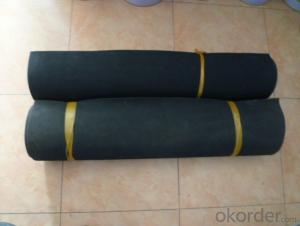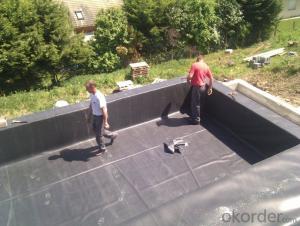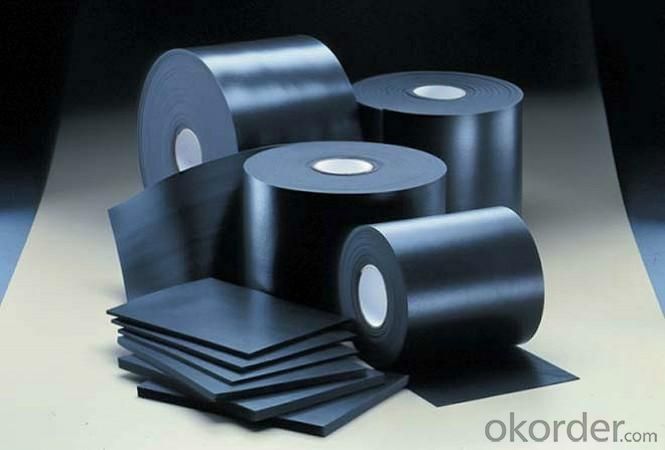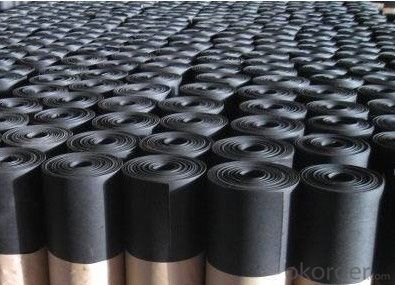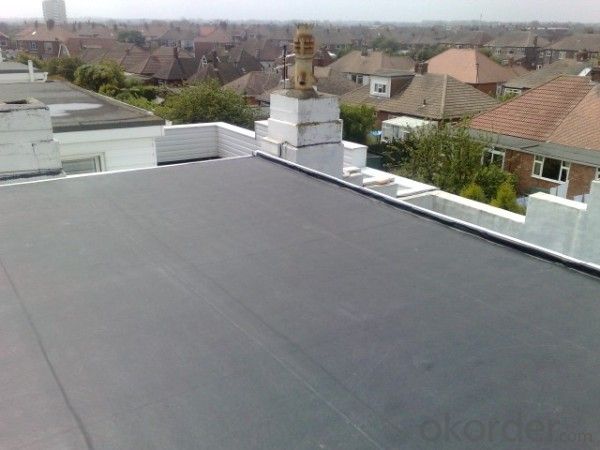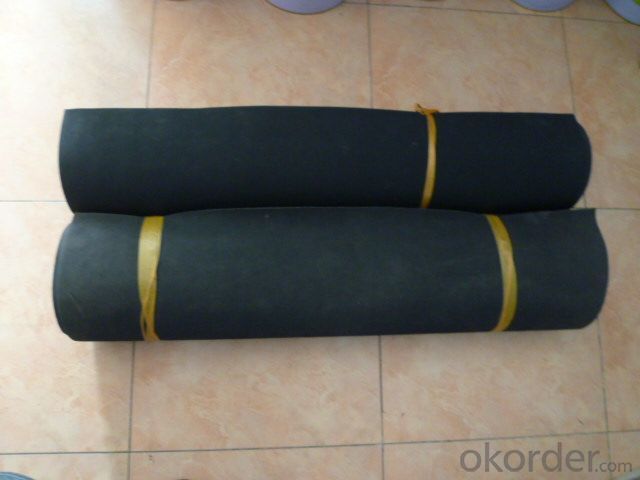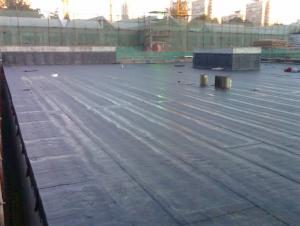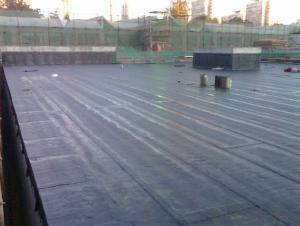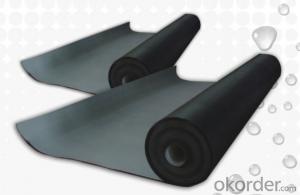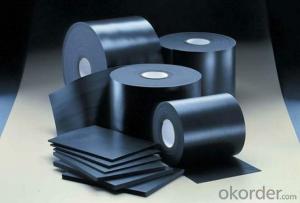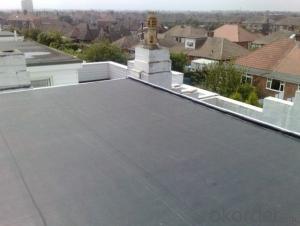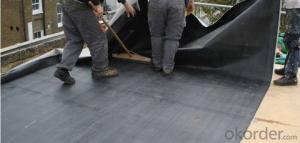EPDM Rubber Coiled Waterproof Membrane for Roofing
- Loading Port:
- Shanghai
- Payment Terms:
- TT OR LC
- Min Order Qty:
- 50000 m²
- Supply Capability:
- 5000000 m²/month
OKorder Service Pledge
OKorder Financial Service
You Might Also Like
EPDM Rubber Coiled Waterproof Membrane for Roofing
Description Of EPDM Rubber Coiled Waterproof Membrane for Roofing:
•EPDM waterproof sheet has excellent anti-ozone-aging performance, able to resist ultraviolet light and corrosion of many chemical corrosive materials in the atmosphere
•It has high tensile strength, high ductility and strong retractility, it has excellent crack resistance, able to effect waterproof function even with tiny vibration of buildings.
• Excellent resistance to ozone, oxidation and sunlight.
• Resistance to chemicals; resistant to most inorganic products.
Main Features of EPDM Rubber Coiled Waterproof Membrane for Roofing:
1>Excellent antiaging performance, service life up to 50 years
2>Working well with in 40C to 100C,it canbe constructed with a single layer in ambient temperature.
3>Waterproofing on various kinds of underground project,industrial of civil buildings and structures.
4>high extension rate, high tensile strength, small size changes at heat treatment
5>Good plant roots penetrability resistance and can be made waterproofing layer of planting roof
6>Special modified molecular structure ,effectively resolving the current domestic and foreign glue joint problem.
7>Good low temperature flexibility, and good performance of adapting to ambient temperature changes.
8>Convenient application ,solid joint, no environment pollution
9>chemical corrosion Resistance, can be used for special occasions
10>Convenient maitenance, low cost.
Specifications of EPDM Rubber Coiled Waterproof Membrane for Roofing:
| Material | EPDM Rubber |
| Size | 1.2m (width)*20m (length) or customized, weldable type 2.05m or 4m width |
| Thick | 1.2mm, 1.5mm, 2.0mm |
| Type | Vulcanized & Weldable |
| Pattern | Non-reinforced (homogeneous) |
| Certificate | ISO9001/14001 |
Applications of EPDM Rubber Coiled Waterproof Membrane for Roofing:
Widely used in roofs, basement, toilet ,swimming pool, and all kinds of industry and civil building waterproofing, reservoir, vivicism, bridge, underground, tunnel and dam waterproofing ,especially to the keystone waterproofing projects which is durability, high corrosion resistance and easy deformation.
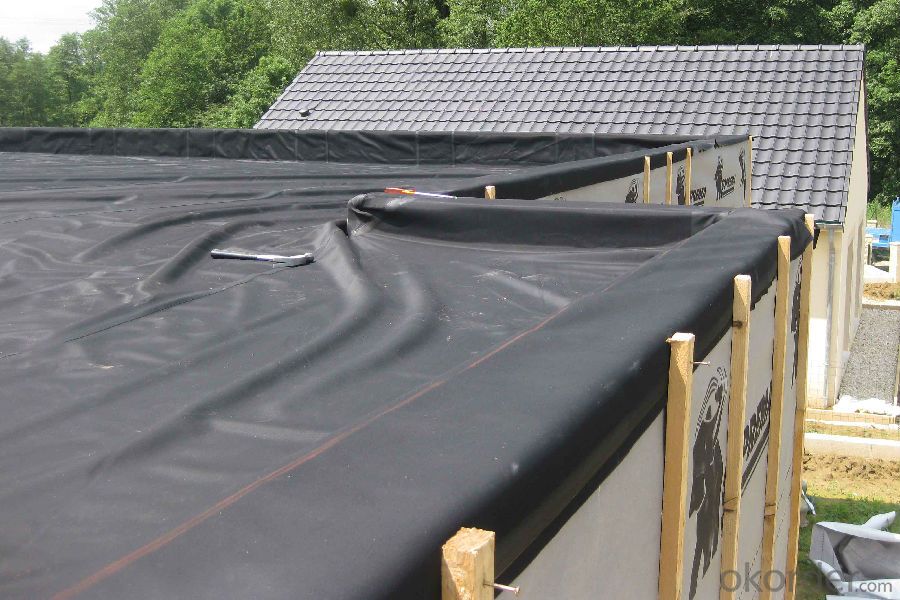
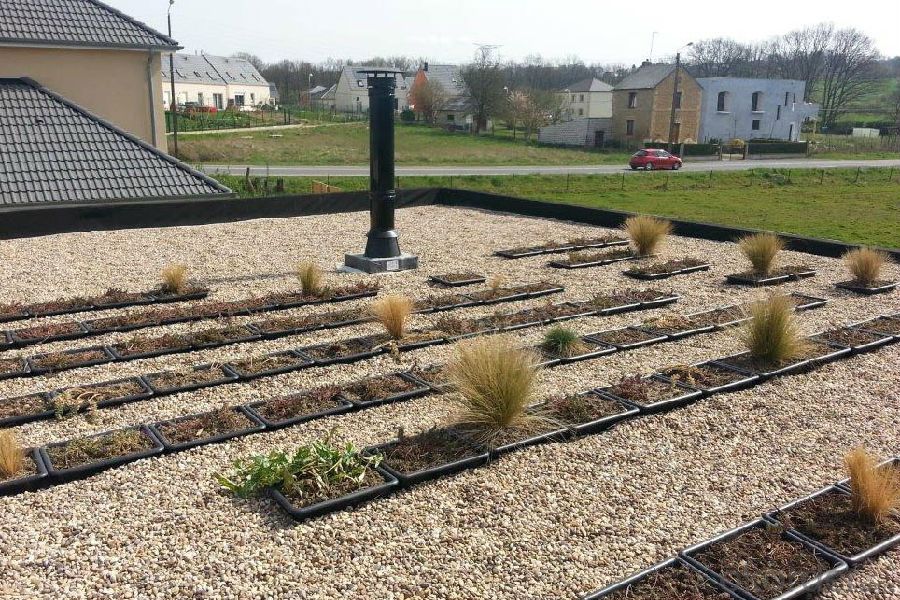
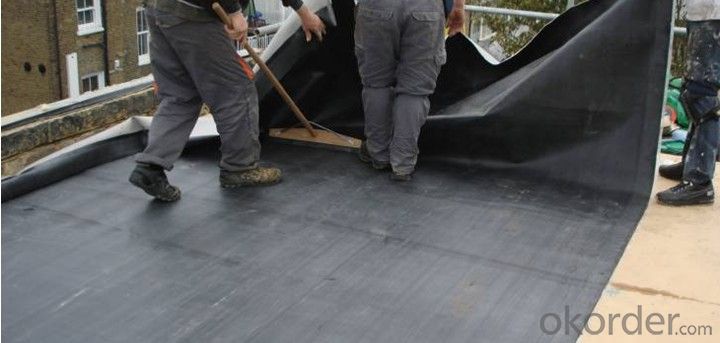
IMages of EPDM Rubber Coiled Waterproof Membrane for Roofing:
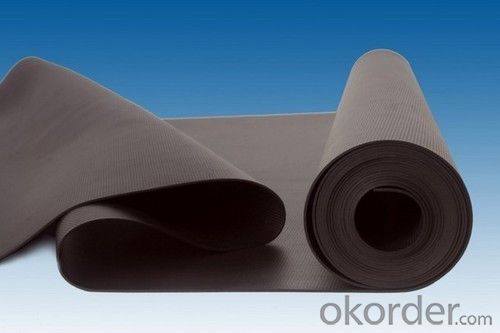
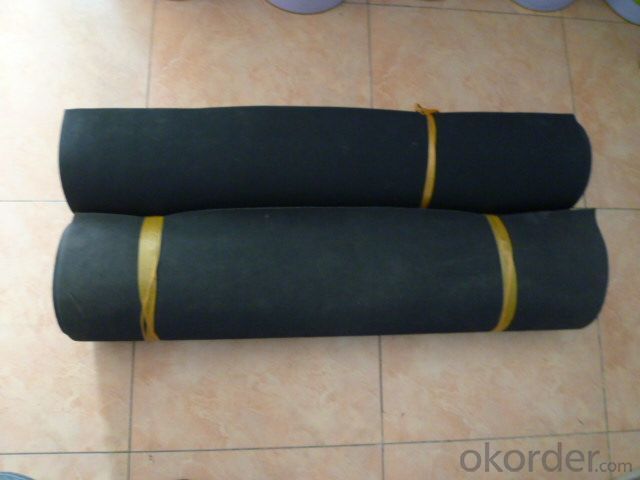
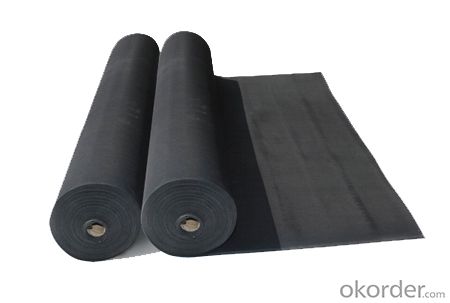
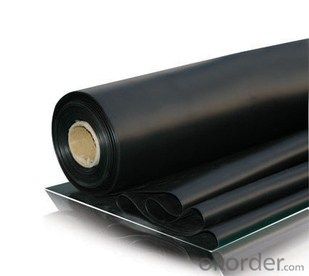
FAQ of EPDM Rubber Coiled Waterproof Membrane for Roofing:
1. What are we supplying?
We are specialized in producing Colorful Asphalt Roof Shingle, SBS/APP modified bitumen waterproof membrane, Self adhesive bitumen waterproof membrane, PVC waterproofing membrane, EPDM rubber roofing membrane, Single Component Polyurethane Waterproof Coating, and Spray Polyurea Waterproof Coating
.
2. How Many years experience do we have?
We have been exported to more than 20 countries in the past 15 years.
3. How long do we usually reply your request?
We always reply our customer within 24 hours.
- Q: Can a waterproofing membrane be used for sewage treatment plants and wastewater facilities?
- Yes, a waterproofing membrane can be used for sewage treatment plants and wastewater facilities. These facilities require a high level of protection against water infiltration and leakage, as they deal with large volumes of wastewater and chemicals. A waterproofing membrane can provide a seamless and impermeable barrier to prevent water from entering or exiting the structure, ensuring the integrity of the facility and preventing contamination of surrounding areas. Additionally, a waterproofing membrane can also protect the facility's infrastructure from the corrosive effects of wastewater and chemicals, prolonging its lifespan and reducing maintenance costs. Therefore, utilizing a waterproofing membrane is a crucial component in the construction and maintenance of sewage treatment plants and wastewater facilities.
- Q: 1.2 thick synthetic polymer waterproofing membrane two weight how to count
- Waterproof to do in what position, the specific requirements, you can contact me, I have a contact in space, the specific use of what materials, synthetic polymer points several categories, the same material is not the same cost
- Q: Can a waterproofing membrane be used for foundation repair?
- Yes, a waterproofing membrane can be used for foundation repair. Waterproofing membranes are commonly used to prevent water intrusion and can be applied to foundation walls to seal any existing cracks or gaps, preventing further damage or leaks. Additionally, they can help improve the overall strength and durability of the foundation, providing long-lasting protection against water damage.
- Q: Can a waterproofing membrane be used in boat decks or marinas?
- Yes, a waterproofing membrane can be used in boat decks or marinas. It is commonly used to protect the underlying structure from water damage and provide a durable, watertight barrier that helps prevent leaks and deterioration.
- Q: Can a waterproofing membrane be used in areas with high foot traffic or heavy loads?
- Yes, a waterproofing membrane can be used in areas with high foot traffic or heavy loads. Waterproofing membranes are designed to provide durability and protect the underlying structures from water damage. They are often used in areas such as basements, balconies, and rooftops, which may experience heavy foot traffic or support heavy loads. However, it is important to choose a membrane specifically designed for high traffic or heavy load areas to ensure it can withstand the intended use.
- Q: Can a waterproofing membrane be used in earthquake-prone areas?
- Yes, a waterproofing membrane can be used in earthquake-prone areas. Waterproofing membranes are designed to provide a barrier against moisture penetration, and they can also offer some degree of flexibility and elasticity. This allows them to withstand the movement and vibrations caused by earthquakes, helping to protect the structure from water damage and potential leaks. However, it is important to ensure that the chosen membrane meets the specific requirements and standards for earthquake-prone areas to ensure its effectiveness and durability.
- Q: Can a waterproofing membrane be used for a swimming pool?
- Yes, a waterproofing membrane can be used for a swimming pool. Waterproofing membranes are commonly used in construction to prevent water penetration and leakage. When applied to the walls and floor of a swimming pool, a waterproofing membrane creates a barrier that prevents water from seeping into the surrounding structures. This is crucial for maintaining the integrity of the pool and preventing damage to the surrounding areas. Waterproofing membranes for swimming pools are specifically designed to withstand the constant exposure to water and chemicals, ensuring long-lasting protection.
- Q: Can a waterproofing membrane be used on precast plaster surfaces?
- Indeed, precast plaster surfaces have a tendency to be porous, enabling them to absorb water. This absorption can ultimately result in water damage and deterioration. Nevertheless, by utilizing a waterproofing membrane, this problem can be mitigated. The application of such a membrane serves to impede water penetration and safeguard the surface against moisture-related predicaments like mold, mildew, and efflorescence. Essentially, the waterproofing membrane functions as a protective barrier, effectively halting water from permeating the plaster and causing harm. It is crucial to ensure that the membrane employed is compatible with the specific type of plaster and is administered accurately in order to attain optimal waterproofing outcomes.
- Q: What is the warranty or guarantee for a waterproofing membrane?
- The warranty or guarantee for a waterproofing membrane typically varies depending on the manufacturer and product. It can range from a few years to a lifetime, generally covering any defects in materials or workmanship that may cause the membrane to fail. It is important to review the specific warranty terms and conditions provided by the manufacturer to understand the coverage and any limitations.
- Q: Can a waterproofing membrane be used on tunnels with lighting systems?
- Yes, a waterproofing membrane can be used on tunnels with lighting systems. The membrane can effectively protect the tunnel structure from water infiltration while allowing the lighting system to function properly.
Send your message to us
EPDM Rubber Coiled Waterproof Membrane for Roofing
- Loading Port:
- Shanghai
- Payment Terms:
- TT OR LC
- Min Order Qty:
- 50000 m²
- Supply Capability:
- 5000000 m²/month
OKorder Service Pledge
OKorder Financial Service
Similar products
Hot products
Hot Searches
Related keywords
